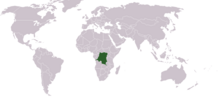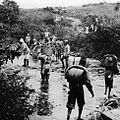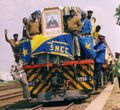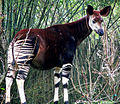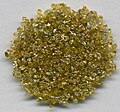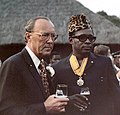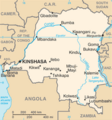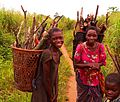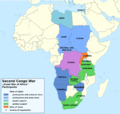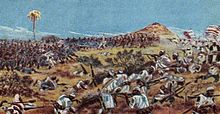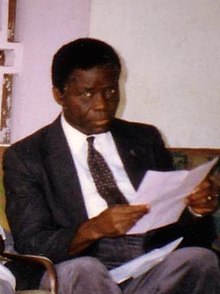Portal:Democratic Republic of the Congo
The Democratic Republic of the Congo Portal
The Democratic Republic of the Congo, also known as Congo-Kinshasa, Congo DR, DR Congo, DRC, or simply either Congo or the Congo, is a country in Central Africa. By land area, the DRC is the second-largest country in Africa and the 11th-largest in the world. With a population of around 105 million, the Democratic Republic of the Congo is the most populous Francophone country in the world, and the fourth-largest in Africa. The national capital and largest city is Kinshasa, which is also the economic center. The country is bordered by the Republic of the Congo, Central African Republic, South Sudan, Uganda, Rwanda, Burundi, Tanzania (across Lake Tanganyika), Zambia, Angola, the Cabinda exclave of Angola, and the South Atlantic Ocean. Centered on the Congo Basin, the territory of the DRC was first inhabited by Central African foragers around 90,000 years ago and was reached by the Bantu expansion about 3,000 years ago. In the west, the Kingdom of Kongo ruled around the mouth of the Congo River from the 14th to 19th centuries. In the northeast, center, and east, the kingdoms of Azande, Luba, and Lunda ruled from the 16th and 17th centuries to the 19th century. King Leopold II of Belgium formally acquired rights to the Congo territory from the colonial nations of Europe in 1885 and declared the land his private property, naming it the Congo Free State. From 1885 to 1908, his colonial military forced the local population to produce rubber and committed widespread atrocities. In 1908, Leopold ceded the territory, which thus became a Belgian colony. Congo achieved independence from Belgium on 30 June 1960 and was immediately confronted by a series of secessionist movements, the assassination of Prime Minister Patrice Lumumba, and the seizure of power by Mobutu Sese Seko in a 1965 coup d'état. Mobutu renamed the country Zaire in 1971 and imposed a harsh personalist dictatorship until his overthrow in 1997 by the First Congo War. The country then had its name changed back and was confronted by the Second Congo War from 1998 to 2003, which resulted in the deaths of 5.4 million people. The war ended under President Joseph Kabila, who governed the country from 2001 to 2019, under whom human rights in the country remained poor and included frequent abuses such as forced disappearances, torture, arbitrary imprisonment and restrictions on civil liberties. Following the 2018 general election, in the country's first peaceful transition of power since independence, Kabila was succeeded as president by Félix Tshisekedi, who has served as president since. Since 2015, the Eastern DR Congo has been the site of an ongoing military conflict in Kivu. The Democratic Republic of the Congo is extremely rich in natural resources but has suffered from political instability, a lack of infrastructure, corruption, and centuries of both commercial and colonial extraction and exploitation, followed by more than 60 years of independence, with little widespread development. Besides the capital Kinshasa, the two next largest cities, Lubumbashi and Mbuji-Mayi, are both mining communities. The DRC's largest export is raw minerals, with China accepting over 50% of its exports in 2019. In 2021, DR Congo's level of human development was ranked 179th out of 191 countries by the Human Development Index and is classed as a least developed country by the UN. , following two decades of various civil wars and continued internal conflicts, around 600,000 Congolese refugees were still living in neighbouring countries. Two million children risk starvation, and the fighting has displaced 4.5 million people. The country is a member of the United Nations, Non-Aligned Movement, African Union, COMESA, Southern African Development Community, Organisation Internationale de la Francophonie, and Economic Community of Central African States. (Full article...) Selected article -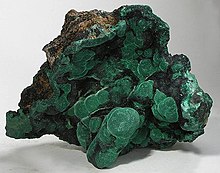 General images -The following are images from various Democratic Republic of the Congo-related articles on Wikipedia.
This is a Good article, an article that meets a core set of high editorial standards.
The Battle of Rejaf, also known as the Battle of Bedden, was fought on 17 February 1897 between the Belgian-led forces of the Congo Free State and Mahdist rebels in Rejaf (now in present-day South Sudan). The battle resulted in a Congolese victory and the permanent expulsion of the Mahdists from the Lado Enclave, as well as the establishment of a Belgian outpost along the Nile. King Leopold II, the Belgian king and ruler of the Congo Free State, acquired the Lado Enclave in South Sudan from Britain in 1894 as part of a territory exchange which gave the British a strip of land along the eastern Congo for Belgian access to the navigable Nile. However, the territory was overrun with Mahdists who had established their stronghold at the town of Rejaf, which occupied a valuable position for trade along the Nile river. After a wave of new funding from the Belgian government in 1895, King Leopold ordered an expedition to be led into the Lado Enclave to expel the Mahdists and fortify Rejaf as a strategic military and trading outpost. (Full article...)This is a Featured article, which represents some of the best content on English Wikipedia..
Marcel Antoine Lihau or Ebua Libana la Molengo Lihau (29 September 1931 – 9 April 1999) was a Congolese jurist, law professor and politician who served as the inaugural First President of the Supreme Court of Justice of the Congo from 1968 until 1975, and was involved in the creation of two constitutions for the Democratic Republic of the Congo. Lihau attended the Catholic University of Leuven in Belgium with the help of sympathetic Jesuit educators, becoming one of the first Congolese to study law. While there he encouraged Congolese politicians to form an alliance that allowed them to secure the independence of the Congo from Belgium. He served briefly as a justice official and negotiator for the Congolese central government before being appointed to lead a commission to draft a permanent national constitution. He was made dean of law faculty at Lovanium University in 1963. The following year he helped deliver the Luluabourg Constitution to the Congolese, which was adopted by referendum. (Full article...)
WikiProjectsTopicsCategoriesRelated portalsAssociated WikimediaThe following Wikimedia Foundation sister projects provide more on this subject:
Discover Wikipedia using portals | ||||||



